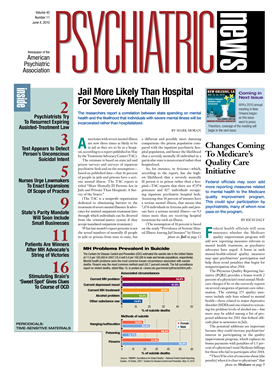Advocates for expanding the scope of practice for several types of nurses continue to lobby state legislatures with the argument that such an expansion would improve access to health care and reduce costs. And they are achieving some successes. Physicians warn, however, that such laws could cause unintended problems for patients, since the nurses do not receive equivalent training to that of physicians in treating many medical disorders.
Maryland, for example, recently became the 29th state to allow nurse practitioners to work without a formal physician agreement when Gov. Martin O'Malley (D) signed the measure (SB 484) into law on April 13.
Its backers say the law will provide greater access to health care in medical “shortage areas,” while saving the state Medicaid program money by eliminating the cost of administrative review of such physician-nurse agreements. Supporters also touted the legislation as providing fair treatment for nurse practitioners.
“The current law works against providing as much health care as possible and as much access to health care as possible because without a collaborative agreement with a physician, nurse practitioners cannot provide care to patients who need it,” said state Sen. Roy Dyson (D) in a written statement. “Indeed, current law ties the nurse practitioners to physicians, so if a physician leaves a practice for whatever reason, the nurse practitioner cannot see or care for patients until a new agreement is reached.”
The new law, which explicitly includes psychiatric nurse practitioners, was strongly opposed by Maryland physicians over concerns that nurse practitioners do not have the education and training to recognize and independently treat complex and serious health conditions.
“They do not have the education and training of physicians,” said Gene Ransom, executive director of the Maryland State Medical Society (MedChi), in an interview with Psychiatric News. “It's important for a physician to be on the hook, so to speak, and be responsible for what [potential complication] comes up with a patient.”
MedChi and the Maryland Psychiatric Society worked to amend the measure to require that nurse practitioners file an “attestation” with the Maryland Nursing Board that the nurse has an agreement with a physician that establishes a plan for collaborating and consulting with a physician and for making referrals. This approach is similar to one the state adopted for nurse midwives in late 2009. The law allows the state Board of Physicians to access a nurse practitioner's attestation as needed, while reducing the administrative time to create such agreements.
Legislation with the same goal of eliminating collaborative agreements between clinical nurse specialists and physicians also is under consideration in the Pennsylvania legislature. While the bill (HB 1922) has yet to advance, some Democratic political candidates have touted such expansions in nurses' scope of practice as a way to expand patients' access to care, according to Deborah Shoemaker, executive director of the Pennsylvania Psychiatric Society (PPS), which opposes the bill.
“This would allow [clinical nurse specialists] to do anything they want in medicine because they wouldn't operate under a collaborative agreement,” Shoemaker said.
Pennsylvania recently began to roll out regulations to implement a 2007 law that overhauled the rules governing the scope of practice of certified registered nurse practitioners (CRNPs). The PPS was successful in its effort to get officials writing the regulations to remove language that would have allowed CRNPs to perform psychiatric evaluations and to commit patients to psychiatric facilities. Pennsylvania law already allows CRNPs to prescribe Schedule II drugs but not other categories of controlled substances.
Similarly, nurse practitioners have lobbied members of the California legislature for several years to reduce or eliminate physician oversight of the care they provide. Physicians' organizations, including the California Psychiatric Association (CPA), negotiated a compromise in the previous legislative session with nursing advocates that maintained physician oversight in this legislation, according to Randall Hagar, the CPA's director of government affairs.
California law requires nurse practitioners and physicians to spell out the scope of the supervisory relationship in writing or to sign a “standardized procedure” document that specifies which drugs may be prescribed by the nurse practitioner, under what circumstances, the extent of physician supervision, and the method of periodic review of the nurse practitioner's competence.
Additionally, California allows nurse practitioners to prescribe medications if they have a prescriptive agreement with a physician and that physician approves patient-specific prescriptions of Schedule II and Schedule III drugs.
Although nurse practitioner advocates in California also claim that expanding their scope of practice will boost patients' access to care, the only specifically access-related initiatives that are advancing as the legislature nears the end of a two-year session are measures to expand the use of telemedicine.
“And we generally support those efforts” as an effective way to expand care access, Hagar said, about the telemedicine initiatives.
